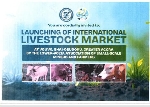Reject flawed Newmont-Zijin deal; sell Akyem Mine to local investor – IEA
 IEA says the deal is not in Ghana's favour
IEA says the deal is not in Ghana's favour
The Institute for Economic Affairs (IEA) says the planned sale by US-based Newmont Company of its Akyem Gold Mine Project in Ghana to China’s Zijin Mining Group for US$1.0 billion is “flawed in several respects, inimical to Ghana’s interest and unacceptable.”
In a statement, the IEA notes that the project lease was signed between the Ghana Government and Newmont on 19th January 2010 and has an expiry period of 15 years, i.e. valid until 19th January 2025.
According to the terms, the lease is transferable within the duration period, subject to mutual agreement between the Government and Newmont.
The lease is also subject to extension after its expiry date, by mutual agreement.
In the IEA’s assessment, the lease has not yet expired and, therefore, “any decision by Newmont to sell the mine must be on a transfer basis and must be for the unexpired term only and subject to Government agreement.”
“At the end of the expiry period, Newmont is obliged to hand over the mine back to Government, the truthful owner of the gold under the assigned land. Any company that wants to operate the mine after the expiry date of the lease must sign a new agreement with the Government. As far as the IEA is aware, Newmont and the Government have not reached any agreement for the mine to be transferred to Zijin for the unexpired term of the lease, i.e. up to 19th January 2025,” the statement noted.
The IEA said it is also not aware that Newmont has evoked the extension clause and that the Government has agreed to such an extension.
“The IEA wishes to point out that apart from Newmont, no other company has an original locus or right in the extension of the Lease.”
The IEA asserts that selling the company to a foreign interest undermines the local investment drive.
“The IEA has learned that some Ghanaian entities also bid for the mine, but were allegedly outbid by Zijin. Allowing a foreign company to take over the mine would, however, be contrary to the President’s own position as he stated in his State of the Nation Address (SONA) in February this year: ‘We will engage with Newmont to give priority to Ghanaian investors who will want to acquire this mine to ensure that our mineral resources better benefit the Ghanaian people.’”
“The question is: what has changed now for the President to set aside his own principle and reject Ghanaian investors in favour of a foreign company?” it asked, emphasising: “The Akyem Gold Mine Lease itself was flawed at its inception in several respects. In particular, the royalties and taxes payable by Newmont were not appropriately quantified as is expected of such agreements.”
Moreover, the IEA said the agreement “is not materially different from other colonial-type agreements that cede Ghana’s mineral rights to foreign companies on a concession basis, enabling them to keep the lion’s share of the products, while Ghana receives only paltry sums as royalties and taxes.”
“The IEA wishes to state categorically that the purported sale by Newmont of the Akyem Gold Mine to Zijin is unjustified and legally flawed and must, therefore, not be ratified by Parliament. Further, if Newmont wishes to sell the mine, it must sell it to Ghanaian investors so that the wealth generated would remain in Ghana for the development of the country,” the IEA proposed.
It said: “Should it be necessary, the Government should team up with the private sector under a public-private partnership (PPP) programme to purchase it,” adding: “Using the reported annual average production figure of 11.4 tonnes of gold by the Akyem Mine (equivalent to 402,123 ounces) and an average world market price of US$2,600 per ounce for gold, the IEA projects annual average yields of US$1.05 billion.”
“This is the amount that would accrue to prospective Ghanaian owners—and the country—per year. Allowing Zijin to buy the mine for US$1.0 billion, which would accrue to Newmont, and presumably allowing Zijin to pay only royalties and taxes to Ghana, would, therefore substantially short-change the country,” the Institute asserted.
In its analysis, the IEA notes that “the deal cannot, therefore, be said to be in the economic interest of the country, and must, therefore, be rejected.”
“The IEA wants to draw attention to the fact that even Canada, where Zijin is also seeking to invest in the domestic critical minerals sector, and planning initially to buy a 15% stake in Canadian copper company, Solaris Resources, has decided to limit Zijin’s stake in the interest of Canadian national security.”
It pointed out: “Canada is linking its national security interest here to foreign participation in its economy, particularly the critical mining sector. Ghana must take a cue from Canada and similarly protect its national security and economic interest.”
“The IEA wishes to make it clear that it is not against Zijin per se as an investor in the Ghanaian mining sector. The IEA is calling, as a matter of principle, for Ghana to maintain dominant ownership of its critical mining sector—and the economy as a whole— and thereby retain the associated wealth at home for the development of the country.”
Further, the stressed that “Ghana’s natural resources represent the low-hanging fruits for acceleration of the country’s development and eradication of its endemic poverty. To achieve these goals, Ghana should maximise the benefits from these natural resources. This can only be done by jettisoning colonial-type mineral contracts skewed in favour of foreign companies.”
“The IEA wishes to reiterate that Ghana cannot afford to continue to sell its birthright cheaply to foreign companies—as it has been doing its entire history—only to descend on the companies’ capitals to beg for aid. President Paul Kagame of Rwanda could not have put it more eloquently when he said: ‘If the owners of natural resources go around begging, then you should know there's something wrong with their minds.’ Ghana needs a complete paradigm shift in its mineral contracts by taking ownership of the minerals to create job opportunities, wealth and technical capacity development for Ghanaians.”
It said: “The United Nations Charter of Economic Rights and Duties of States (GA res. 3281(xxix), UN GAOR, 29th Sess., Supp. No. 31 (1974) 50 shows the way as it entreats countries to derive maximum benefits from their natural resources for their development. Ghana should not depart from this noble cause, but should rather exploit it fully to its advantage.”
It noted that the “usual excuse given by Ghanaian officials that the country lacks the requisite capital and expertise locally for exploiting its natural resources and, therefore, has to depend on foreign investors and compensate them accordingly is no longer tenable.”
It highlighted that “other countries with similar conditions as Ghana’s have been able to negotiate much better terms for the exploitation of their natural resources. Ghana can do likewise by negotiating more favourable production-sharing or service contracts. Ghana also needs to resource the Geological Survey Department to enable it to map out mineral deposits, which can be used as collateral to raise capital and hire the needed expertise to exploit them.”
At the same time, the Institute said “steps must be taken to train local mining engineers so that they can provide the needed expertise to exploit Ghana’s natural resources using environmentally friendly means.”
Finally, the IEA proposed the amendment of Article 257(6) of the Constitution that vests Ghana’s natural resources in the President on behalf of, and in trust for, the people, which, it says, “seems to give him a carte blanche to sign the resources away at will,” insisting: “The natural resources should rather be vested in the state and every contract should require Parliamentary ratification as per Article 268(1) of the Constitution.”
Secondly, the IEA suggested the introduction, in the Constitution or the Minerals and Mining Act, 2006 (Act 703), of a provision that prohibits the Government from signing contracts above a specified monetary value six months to the end of their four-year term. “This will prevent incumbent administrations from signing eleventh-hour contracts in favour of their families, friends or cohorts, or for personal gain.”
Trending Business

Muntaka Entrepreneurship Hub trains over 100 women in Asawase
14:16
Ghana Gold Board rakes in over $10bn ahead of target
09:56
GEXIM faces GHS1.5bn credit exposure as NPLs near 30% — CEO
09:36
Six Degrees delivers immersive experiential production at Kweku Smoke’s revival concert
10:37
GIPC highlights govt’s commitment to retail sector transformation at GUTA conference
03:01
Lower-Volta Small-Scale Miners & Farmers to host international livestock market
00:43
Nigeria's commercial dispute involving Ghanaian firm raises bilateral trade concerns-UK Certified Customer Communication expert warns
21:31
GoldBod Jewellery, GTA launches December homecoming promotion for diaspora visitors
17:15
Global cocoa prices soared, but Ghanaian farmers gained little – Randy Abbey
15:40
GIPC CEO joins Vice President to open new sanitary pad production line
09:23



